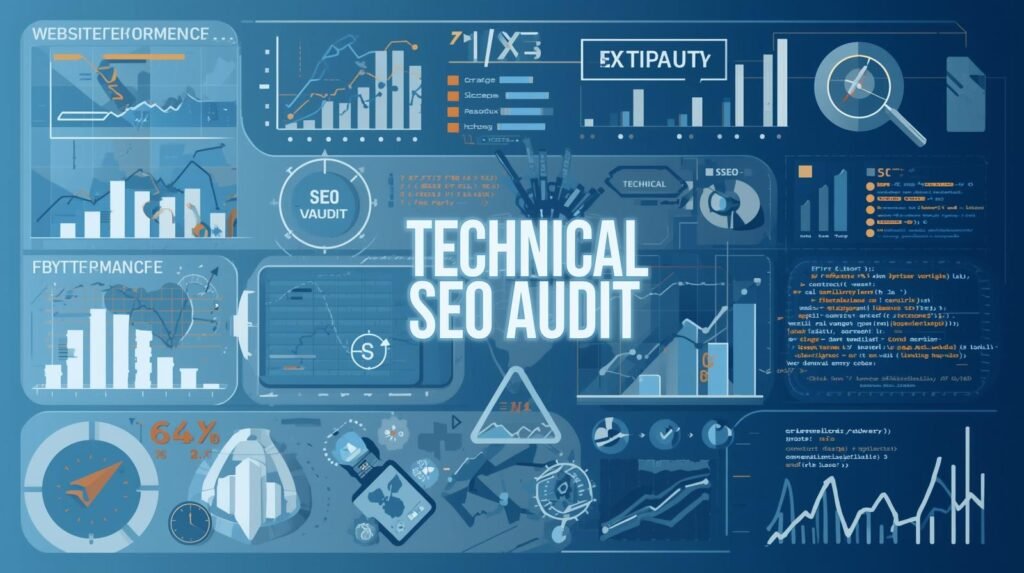Introduction: Why Technical SEO Audit Services Are Essential in 2025
The digital landscape in 2025 is more competitive than ever. Search engines are smarter, users expect faster websites, and Google continuously refines its ranking algorithms. For businesses, this means one thing: ignoring technical SEO audit services is no longer an option.
Think of your website as a car. You might have sleek design (the paint job) and engaging content (the engine fuel), but if the engine itself is faulty, the car won’t go far. Technical SEO audits are like a full-service inspection. They reveal hidden problems—broken links, slow-loading pages, mobile usability issues—that can quietly cripple your search rankings and user experience.
Why does this matter? Google prioritises websites that deliver smooth, secure, and fast experiences. If your site isn’t technically sound, no amount of content or backlinks will keep you competitive.
In this guide, we’ll cover:
-
What technical SEO audits are and what services they include.
-
Key benefits for businesses in 2025.
-
The main areas a professional audit examines.
-
Tools used by experts.
-
Common issues revealed in audits.
-
How to choose the right technical SEO service provider.
-
FAQs to clarify the process.
By the end, you’ll understand why investing in technical SEO audit services is like building the foundation of a skyscraper—without it, everything else crumbles.
What Are Technical SEO Audit Services?
Technical SEO audit services are professional evaluations of a website’s backend structure, performance, and compliance with search engine best practices. Unlike general SEO, which focuses on content and keywords, technical SEO ensures your website is accessible, indexable, and optimised for both search engines and users.
Core Elements of a Technical SEO Audit
-
Crawling & Indexing Analysis
-
Can search engines crawl your pages?
-
Are there blocked resources in robots.txt?
-
Do you have unnecessary noindex tags?
-
-
Site Architecture & Navigation
-
Logical hierarchy of pages.
-
Proper internal linking strategy.
-
Clear URL structures.
-
-
Mobile Usability
-
Responsive design.
-
Mobile-first indexing compliance.
-
Tap-friendly navigation.
-
-
Site Speed & Performance
-
Page load times.
-
Core Web Vitals compliance (Largest Contentful Paint, Cumulative Layout Shift, First Input Delay).
-
Server response optimisation.
-
-
Security & HTTPS
-
SSL certificate validity.
-
Mixed content checks.
-
Security headers.
-
-
Structured Data & Schema
-
Proper implementation of schema markup.
-
Rich results eligibility.
-
-
Duplicate Content & Canonicals
-
Identifying duplicate pages.
-
Correct use of canonical tags.
-
-
XML Sitemaps & Robots.txt
-
Updated, clean XML sitemaps.
-
No conflicting robots.txt instructions.
-
-
Error Analysis
-
Broken links (404 errors).
-
Redirect chains and loops.
-
Server error (5xx) checks.
-
Deliverables from an Audit Service
-
A full report detailing issues and opportunities.
-
Priority recommendations (critical fixes vs. enhancements).
-
Roadmap for developers and marketers to implement changes.
A professional audit isn’t just about finding problems—it’s about uncovering opportunities to make your website technically flawless.
Benefits of Technical SEO Audit Services
Investing in technical SEO audits may feel like routine maintenance, but the rewards are significant.
Improved Crawlability & Indexing
Search engines can’t rank pages they can’t crawl. An audit ensures every valuable page is discoverable and indexable.
Higher Rankings
Technical health directly impacts SEO. Google rewards fast, secure, user-friendly websites.
Better User Experience
Page speed, mobile usability, and intuitive navigation all improve customer satisfaction—and conversions.
Future-Proofing Against Algorithm Updates
A technically optimised site is less likely to suffer from sudden drops after algorithm changes.
Maximised ROI from Content & Links
If your technical foundation is weak, your investments in content marketing or backlinks won’t pay off. An audit ensures you’re leveraging every effort.
Competitive Advantage
Most businesses still overlook technical SEO. By investing in it, you gain an edge in crowded markets.
Key Areas Covered in a Technical SEO Audit
Let’s break down the critical components professionals examine:
1. Crawling & Indexation
Tools like Screaming Frog and Google Search Console are used to detect pages blocked by robots.txt, crawl budget issues, or pages that aren’t being indexed.
2. Core Web Vitals & Site Speed
Google’s PageSpeed Insights or Lighthouse evaluate speed metrics. A slow website hurts rankings and conversions—Amazon once reported a 1% revenue drop for every 100ms delay.
3. Mobile Optimisation
Since Google uses mobile-first indexing, audits assess responsive design, font sizing, and tap target accessibility.
4. URL & Site Structure
SEO-friendly URLs are short, descriptive, and keyword-rich. Audits flag messy URLs, orphan pages, or poor internal linking.
5. Security
HTTPS is a confirmed ranking factor. Audits check for valid SSL, HSTS headers, and mixed-content errors.
6. Duplicate Content Issues
Audits identify duplicate title tags, meta descriptions, or content caused by filters, session IDs, or parameterised URLs.
7. Structured Data
Schema helps search engines understand your content. Audits check for JSON-LD errors and opportunities to earn rich snippets.
8. Error & Redirect Checks
Broken links frustrate users and waste crawl budget. Audits fix 404s, redirect chains, and 302 vs. 301 misuses.
By systematically reviewing these areas, audits uncover both glaring issues and hidden technical opportunities.

Tools Used in Technical SEO Audit Services
Professionals use a mix of free and premium tools:
-
Google Search Console – Index coverage, crawl stats, and errors.
-
Google PageSpeed Insights – Core Web Vitals analysis.
-
Screaming Frog SEO Spider – Crawl simulations.
-
Ahrefs / SEMrush / Moz – Backlink audits, crawl stats, and competitive data.
-
GTMetrix – Page performance optimisation.
-
Sitebulb – Visual site audits and advanced crawling.
An expert service combines automated insights with human analysis to create actionable recommendations.
Common Issues Revealed by Technical SEO Audits
-
Crawl waste—bots indexing irrelevant pages like tag archives.
-
Duplicate content due to poor canonicalisation.
-
Slow-loading pages due to uncompressed images.
-
Mobile usability errors (e.g., buttons too close).
-
Outdated or missing XML sitemaps.
-
Incorrect redirects after site migrations.
-
Lack of structured data markup.
-
Mixed HTTP/HTTPS content causing browser warnings.
These issues often go unnoticed until rankings drop or traffic stalls. An audit prevents that.
Choosing the Right Technical SEO Audit Service Provider
-
Not all providers deliver the same quality. Here’s how to pick wisely:
Check Their Process
Do they just run automated scans, or do they provide tailored analysis and implementation support?
Look for Transparency
A good provider shares detailed reports, plain-English explanations, and prioritisation of fixes.
Ask for Case Studies
Providers with proven results are more trustworthy.
Avoid Red Flags
Beware of “instant fixes” or agencies promising #1 rankings overnight.
Evaluate Pricing
Technical SEO audits typically cost:
-
Small sites (up to 100 pages): £500–£1,500
-
Medium sites (100–1,000 pages): £1,500–£5,000
-
Large/enterprise sites (1,000+ pages): £5,000+
Remember: the cost of inaction—lost rankings, poor UX, lower conversions—is far higher.
-
Conclusion: Building a Solid SEO Foundation
Content and backlinks get the spotlight, but the unsung hero of SEO is technical health. Without it, your site is like a mansion built on quicksand.
By investing in technical SEO audit services, businesses ensure their sites are crawlable, indexable, fast, secure, and user-friendly. This creates the foundation for sustainable rankings, better user experiences, and higher conversions.
Don’t wait for problems to tank your traffic—be proactive. Run regular audits, partner with trusted providers, and treat technical SEO as the backbone of your digital strategy.
FAQ
Most frequent questions and answers
At least once a year, and after major site changes like migrations.
Yes, using tools like Google Search Console or Screaming Frog, but expert audits with Digital Robin go deeper.
Small sites: 1–2 weeks. Large sites: 3–6 weeks.
Some providers only deliver reports, while others also implement recommendations.
Not instantly, but implementing fixes can lead to significant improvements within weeks or months.
Also, read: –
- Digital Marketing Agency: Expectations vs. Reality
- What are SEO Services and Why Do they Matter?
- Why We Love Google Ads service (And You Should, Too!)
- The Next Big Thing in Digital Marketing Services
- Getting the most out of your Web Design Company UK
- Why Nobody Cares About Domain Name Search
- Meet the Steve Jobs of the Web Design Company


